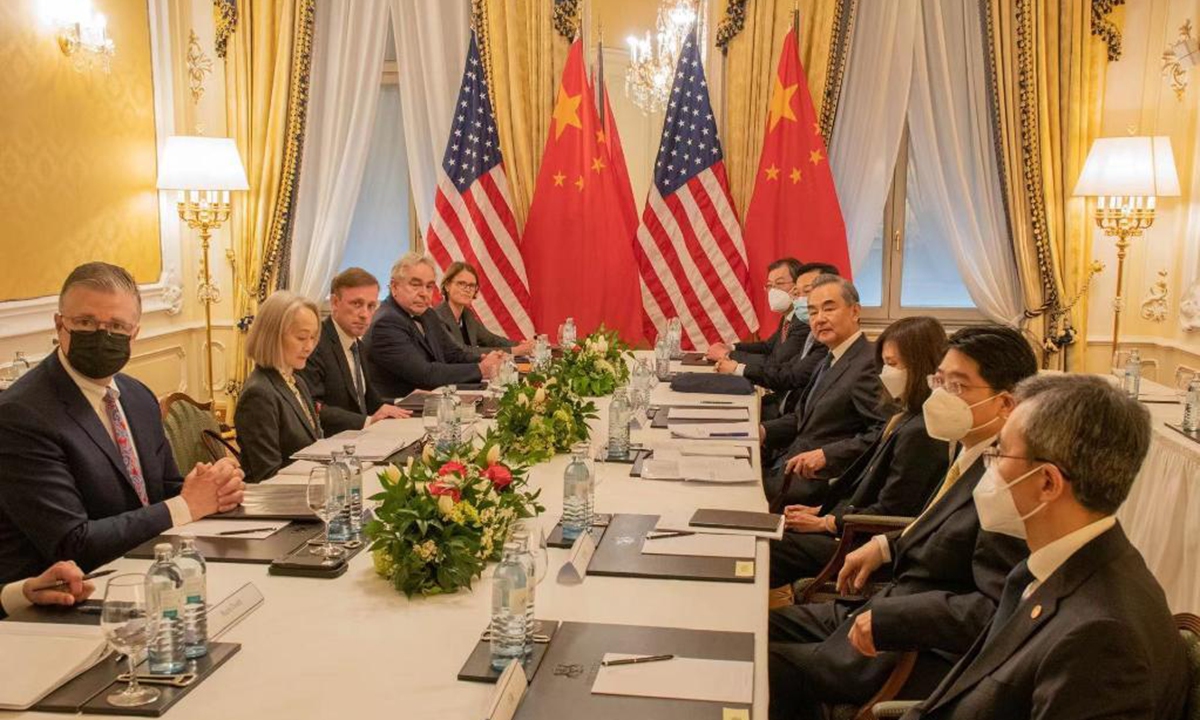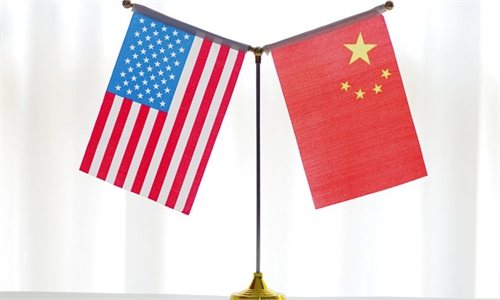Washington cannot warm up China-US relations using only words: Global Times editorial

Wang Yi, a member of the Political Bureau of the Communist Party of China (CPC) Central Committee and director of the Office of the Foreign Affairs Commission of the CPC Central Committee, meets with U.S. National Security Advisor Jake Sullivan in Vienna, Austria, May 10, 2023. Photo: Xinhua
On May 10 and 11, Wang Yi, director of the Office of the Foreign Affairs Commission of the Communist Party of China Central Committee, held talks with US National Security Advisor Jake Sullivan in Vienna, Austria. A senior Chinese official familiar with the situation told the Global Times that the two sides held multiple rounds of discussions for more than 10 hours on important issues, including China-US relations, the Taiwan question, the Asia-Pacific situation, and the Ukraine crisis. The talks were frank, in-depth, substantive, and constructive.
It is noteworthy that the tone and wording of the White House's briefing are similar to those of the Chinese side, indicating that the official evaluation of the talks' significance by both sides is relatively close, giving further strength to the positive signals from the talks.
The international community widely regards the meeting as a good thing and a major progress. From the reactions of the media, we can feel the common expectations of the international community, including the US. Even media outlets like VOA quoted experts as saying that it may mean that the tense relationship between Beijing and Washington is really beginning to ease. The resumption of high-level face-to-face communication between China and the US has helped the two countries bring the issues back to the track of dialogue and negotiation. It also helps to alleviate the worries and pressures brought by the tense relationship between China and the US to the region and the world.
However, many foreign media outlets have mentioned that China's response "seems lukewarm," and that it has not shown as much enthusiasm as the US. The comments of Chinese netizens have also received attention. In short, they do not think that the US can change its hostile attitude toward China. Many netizens said they do not believe that Washington would change its stance, especially on the Taiwan question. This time, the US has experienced the "coldness" of Chinese society.
Who can be blamed for this? It is the result of the actions of the US over a long period of time, repeatedly disappointing and angering the Chinese society, which originally bore goodwill and fondness toward the US, leaving the hearts of the Chinese people cold. The talks took place against the backdrop of severe damage to mutual trust between the two sides. The US has already bankrupted its credibility in Chinese society and needs a "bankruptcy reorganization." The US cannot "cash out" in Chinese society just by making verbal statements. The US should deeply reflect on the significant changes in Chinese public opinion toward it, since Washington often mentions the "Chinese people."
In the eyes of the Chinese people, first, the current US is unwilling to see China prosper and become strong, and is using all means at its disposal to contain and suppress China. Second, it does not respect China, provokes China's core interests and prevents it from achieving reunification. Third, the US' words are inconsistent with its actions. The US continues to reinforce these three impressions that Chinese people have of it through its actions, and the Chinese people cannot help but think it this way. While "abandoning illusions," the Chinese people's understanding of bilateral relations and their perception of the US are becoming more clear, objective, and comprehensive, which is a reflection of the mature mentality of the nation.
It is not that China is intentionally "snubbing" the US, but rather a true reflection of Chinese public opinion. Since the US has done so many things that harm China's interests, it is impossible to expect the Chinese people to be indifferent or even enthusiastic toward the US. When people's hearts are cold, it takes effort to warm them up again. This is a practical situation that the US cannot avoid when dealing with China-US relations. If the Chinese misunderstand the US, then the US should prove that it is a misunderstanding. Otherwise, this will not only be an obstacle to the easing of bilateral relations, but may also become a factor that exacerbates the poor state of bilateral relations.
Recently, the US has repeatedly complained that China does not answer its calls and "ignores, rejects, or cancels multiple high-level communication requests" made by the US. The intention behind this has been seen through even by the US media. Bloomberg stated that this is aimed at showing US allies in Asia and Europe that the US is the responsible party, and creating the impression that the US wants to talk but China is giving it the cold shoulder. Some US officials even told the media that Washington is also trying to appear responsible so that it doesn't lose a global public image contest to Beijing. This has made the Chinese people more convinced that the US' communication proposals are not made in good faith, but are simply an attempt to blame China for "damaging China-US relations."
The importance of China-US relations is self-evident. China has always advised the US from the standpoint of a responsible major country, urging it to correct its perception of China, return to rationality, and do up the top button of bilateral relations. We also hope that the US can take practical actions to prove that it is indeed "managing competition responsibly" rather than dealing with China opportunistically. Washington needs to understand that the US' "lick the plate clean" style of diplomacy will not gain any benefit from China.

